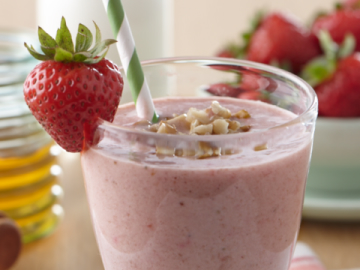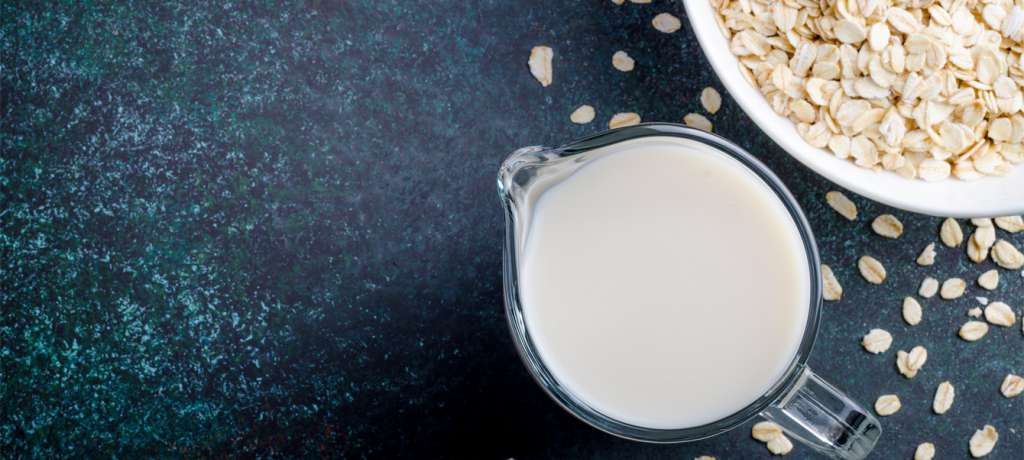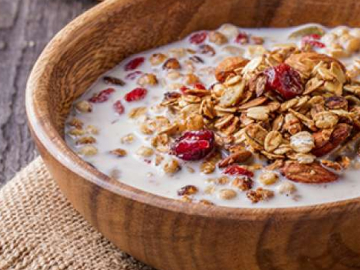Milk Vs. Sports Drinks
Milk has been fueling athletes for centuries and has a natural nutrient combination not found in formulated sports drinks. It stands alone as the Original Sports Drink and is the clear choice for athletes of all ages to fuel athletic performance and to repair, rehydrate and replenish their muscles and bodies.
Here we’ll break down the science of how milk supports everything from helping build strong bones to reshaping and recovery.
Build Strong Bones and Muscles
Regularly drinking milk during the growing years—all the way through late teens/early twenties—is associated with greater height in the teen years, and greater bone size and bone mineralization. Plus, one 8-ounce glass of milk provides eight grams of natural, high-quality protein. Protein is important for many reasons — it helps to build lean muscle and keep bones strong. Furthermore, not all sources of protein are created equal. Milk is a “complete” protein, which provides the full mix of essential amino acids. Simply, milk provides a strong foundation for growing athletes.
Training Fuel
As a naturally-nutrient rich way to fuel athletic performance, milk is a clear choice for athletes. See how milk can help support training by delivering a nutrient package that athletes of all ages need, including many not found in formulated sports drinks:
- ○ A natural source of high-quality protein to build lean muscle.
- ○ Vitamin A, zinc and selenium to support a healthy immune system.
- ○ 4 B vitamins – riboflavin (B2), niacin (B3), pantothenic acid (B5) and vitamin B12 – to help convert food into energy.
- ○ Calcium, vitamin D, phosphorus and protein to build and maintain strong bones and reduce the risk for stress fractures.
- ○ Iodine to help regulate metabolism.
- ○ Potassium* to help maintain normal muscle function and regulate the balance of fluids in the body.
Replenish and Rehydrate
Milk is a natural choice when it comes to electrolytes, providing many of the same electrolytes that are added to commercial recovery drinks (calcium, potassium, sodium and magnesium) along with fluids to help you rehydrate. In fact, some research suggests milk may help you stay more hydrated after exercise than some commercial sports drinks.
Drinking low-fat or fat-free milk after exercise could restore hydration better than other popular post-exercise beverages, according to one study. They found that milk may be more effective than water or sports drinks at restoring and maintaining normal hydration status after exercise, likely due to milk’s electrolyte content and energy density.1
In a second study, the same researchers found that drinking fat-free milk after exercise-induced dehydration restored fluid balance better than a commercial sports drink. The researchers concluded that “milk can be an effective post-exercise rehydration drink, with subjects remaining in net positive fluid balance throughout the recovery period.”2
Drinking milk after exercise can also help replace essential electrolytes that are lost in sweat. These essentials include potassium, sodium, magnesium and calcium. The loss of calcium is of particular concern since research suggests rigorous exercise may cause substantial calcium loss, which could increase the risk of stress fractures.3-5
Fat-free and full-fat milk rank higher for hydration than other beverages like water and sports drinks, according to a study. Researchers attributed milk’s beneficial hydration effect to the electrolytes sodium and potassium, which are naturally found in milk.6
According to another study, it was found that drinking fat-free milk after exercise also replenishes lost electrolytes and rehydrates better than a sports drink or water. Researchers noted additional benefits of rehydrating with milk are its natural protein for muscle building, and milk’s other essential nutrients, including calcium, phosphorus and vitamin A.7
Rebuild
Milk contains high-quality protein to help repair and rebuild muscles after strenuous exercise.
Several studies have found that subjects who drank regular milk after a rigorous workout experienced less exercise-induced muscle damage and muscle soreness than those who drank typical sports drinks or water.8-11
In one study, healthy untrained volunteers were randomly assigned to receive a drink containing either different types of milk protein—casein, whey protein or placebo—one-hour after performing a bout of resistance training. Consumption of both types of milk protein were found to bring about a similar positive net muscle protein balance, indicating that whole protein consumption can stimulate muscle protein synthesis after resistance exercise which over time could lead to increased muscle size and strength.12
Researchers found that as little as nine grams of milk protein increased markers of muscle building following a bout of resistance exercise. They concluded that a product with that amount of milk protein would be effective post-exercise.13
Reshape
Drinking milk post-workout could help athletes tone up and reshape their bodies, according to research. Milk and milk’s high-quality protein have been shown to help athletes gain more lean muscle and lose fat when compared to drinking a carb-only beverage as part of a regular workout and recovery routine.
In a study of healthy, untrained men, those who consumed fat-free milk after exercise gained more muscle and lost more body fat at the end of a 12-week training program than those who drank a soy protein beverage or a carb-only beverage. All three beverages had the same amount of calories. 14
The researchers suggested that “milk is an effective drink to support favorable body composition changes in women with resistance training.” Another similar study in women found that including fat-free milk in a recovery routine during a 12-week training program resulted in greater muscle mass, strength gains, fat loss, and even a potential protective effect on bone health, compared to a carb-only sports drink with the same calories.15
- *Based on the 2019 DRI for potassium established by National Academies of Science, Engineering and Medicine
- 1. Shirreffs SM. Watson P. Maughan RJ. Milk as an effective post-exercise rehydration drink. British Journal of Nutrition. 2007;98:173-180.
- 2. Watson P, Love TD, Maughan RJ, Shirreffs SM.. A comparison of the effects of milk and a carbohydrate electrolyte drink on the restoration of fluid balance and exercise capacity in a hot, humid environment. European Journal of Applied Physiology. 2008;104:633-642.
- 3. Martin BR, Davis S, Campbell WW, Weaver CM. Exercise and calcium supplementation: effects on calcium homeostasis in sports women.Medicine & Science in Sports & Exercise. 2007; 39:1481-1486.
- 4. Sawka MN, Montain SJ. Fluid and electrolyte supplementation for exercise heat stress. American Journal of Clinical Nutrition.2000;72:564S-572S.
- 5. Klesges RC, Ward KD, Shelton ML, Applegate WB, Cantler ED, Palmieri GM, Harmon K, Davis J.. Changes in bone mineral content in male athletes. Mechanisms of action and intervention effects. Journal of the American Medical Association. 1996; 276:226-230
- 6. Maughan RJ, Watson P, Cordery PA, Walsh NP, Oliver SJ, Dolci A, Rodriguez-Sanchez N, Stuart DR. A randomized trial to assess the potential of different beverages to affect hydration status: development of a beverage hydration index. American Journal of Clinical Nutrition. 2015;103:1-7.
- 7. Seery S, Jakeman P. A metered intake of milk following exercise and thermal dehydration restores whole-body net fluid balance better than a carbohydrate–electrolyte solution or water in healthy young men. British Journal of Nutrition. 2016;116:1013–1021.
- 8. Cockburn E, Hayes PR, French DN, Stevenson E, St Clair Gibson A. Acute milk-based protein-CHO supplementation attenuates exercise-induced muscle damage. Applied Physiology, Nutrition & Metabolism. 2008;33:775-783.
- 9. Cockburn E, Stevenson E, Hayes PR, Robson-Ansley P, Howatson G, Effect of milk-based carbohydrate-protein supplement timing on the attenuation of exercise-induced muscular damage. Applied Physiology, Nutrition and Metabolism. 2010;35:270-277.
- 10. Rankin P, Stevenson E, Cockburn E. The effect of milk on the attenuation of exercise-induced muscle damage in males and females. European Journal of Applied Physiology. 2015; 115(6):1245-1261.
- 11. Cockburn E, Robson-Ansley P, Hayes PR, Stevenson E. Effect of volume of milk consumed on the attenuation of exercise-induced muscle damage. European Journal of Applied Physiology. 2012; 112(9):3187-3194.
- 12. Tipton K, Elliott T, Cree M, Wolf S, Sanford A, Wolfe R. Ingestion of casein and whey proteins result in muscle anabolism after resistance exercise. Medicine & Science in Sports & Exercise. 2004;36: 2073-2081.
- 13. Mitchell CJ, Zeng N, D’Souza R, Mitchell S, Aasen K, Fanning A, Poppitt S, Cameron-Smith D. Minimal dose of milk protein concentrate to enhance the anabolic signaling response to a single bout of resistance exercise; a randomized controlled trial. Journal of the International Society of Sports Nutrition. 2017; 14:17.
- 14. Hartman JW, Tang JE, Wilkinson SB, Tarnopolsky MA, Lawrence RL, Fullerton AV, Phillips SM. Consumption of fat-free fluid milk following resistance exercise promotes greater lean mass accretion than soy or carbohydrate consumption in young novice male weightlifters. American Journal of Clinical Nutrition. 2007;86:373-381.
- 15. Josse AR, Tang JE, Tarnopolsky MA, Phillips SM. Body composition and strength changes in women with milk and resistance exercise.Medicine & Science in Sports & Exercise. 2010;42:1122-1130.




